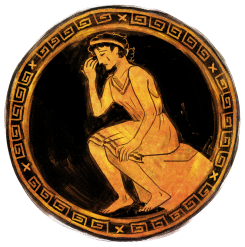Dramatic tragedy is a relief because you know how it will end. As the chorus explains midway through UC Follies’ production of Antigone, it can be peaceful to not have to worry about hope. You know your path; now you just have to bear it.
In honour of the UC Follies Theatre Company’s first ever production in 1885, the company is currently performing the version of Antigone by Jean Anouilh, which is based on the Greek tragedy by Sophocles. Antigone, the daughter of Oedipus, defies the authority of King Creon when he decrees that the body of her rebel brother Polynices will not have a proper burial. At the risk of punishment by death, Antigone attempts to bury her brother’s body and put his soul to rest. The play deals with the characters’ clashing perspectives as they struggle with the inevitable deadly outcome.
Anouilh’s rendition of Antigone was originally performed in Nazi-occupied Paris, adding subtle emphasis to Antigone’s rejection of a brutal authority. The present-day Follies’ production was staged in the UC Junior Common Room and is set in 1940s Europe. To emphasize the play’s contemporary setting, the cast uses French pronunciations of the characters’ names.
Directors Shak Haq and Noa Katz move beyond Anouilh’s script to great effect, creating a four-person Greek style chorus to act as both omniscient narrators and Creon’s staff. As soon as doors open, the members of the chorus are in character: they direct the audience to their seats, dust around the room, and fluff pillows. During the show, they provide context and foreshadow the action, alternating phrases between them and adding emphasis by stating some lines in unison. Unfortunately, Thursday’s preview show had the four actors occasionally interrupting each other while delivering their tightly-spaced lines.
Since most of the action takes place off-stage, it falls to the actors to push the story forward with their depictions of the characters’ emotional conflicts. The principal actors pull this off very well, most notably in a stand-off scene between Antigone and Creon. Siobhan O’Malley’s Antigone stares off into the distance with idealistic determination to carry out her plans, while Haq’s Creon is unyielding in his insistence that the law of the land is just. Both actors are able to show the clashing perspectives of their characters through a combination of their expressions, tones, and postures.
Antigone leaves the audience full of intense and profound questions. What consequences are you willing to face to do what you think is right? How far are you willing to go, and who are you willing to hurt to keep your view of justice and authority intact? The play provides no answers, instead detailing the perspectives of characters who see the issue of Polynices’ burial in very different ways. No matter which character you agree with, one thing is certain: when compromise is made impossible, a disastrous ending is unavoidable.


